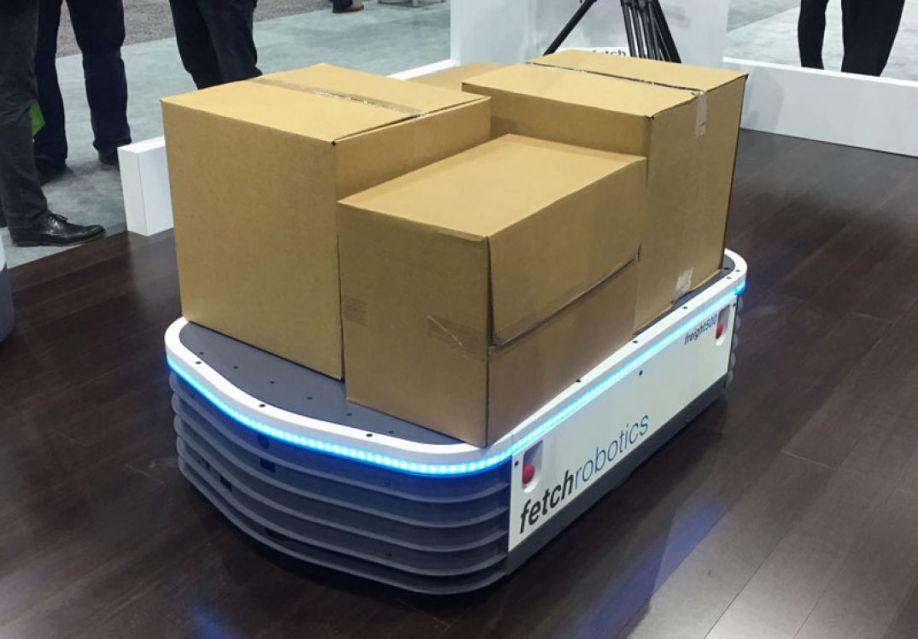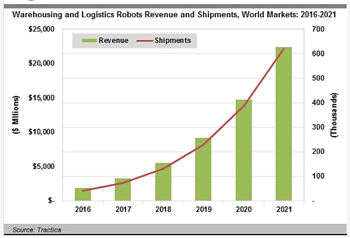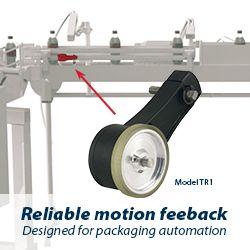Retailers and logistics companies have been opening facilities at a record pace and in this fast-paced world, warehousing and logistics managers are looking for robotics solutions to remain competitive.
The changing landscape of mobility as seen at Automate and ProMat
Frank Tobe | The Robot Report
Reprinted with permission from The Robot Report:
America's retailers are closing stores faster than ever while demand for warehouse workers by online retailers is higher than ever. Retailers and logistics companies have been opening facilities at a record pace and in this fast-paced world, warehousing and logistics managers are looking for robotics solutions to remain competitive.

UPDATED 4/18/2017 to show Chinese entry into mobile robot race. See below.
Chicago's huge McCormick Place Conference Center was once again home to the Automate and ProMat trade shows. ProMat for material handling solutions; Automate for robotics. Over 900 exhibitors covered 350,000 sq ft at ProMat while 400+ companies exhibited at the Automate show. Most of the companies listed below exhibited at one or both of these two shows.

According to an article in The Wall Street Journal, the warehousing and logistics sectors are expanding dramatically as more people shop online. The two sectors accounted for 945,200 jobs in March, up 5.3% over 2015, according to the Bureau of Labor Statistics.
Tractica, a market intelligence firm, forecasts revenue for the two sectors will grow exponentially and reach $22.4 billion by the end of 2021.
Hence the many new mobility products at the ProMat show and the mood of the attendees to be buyers/adopters rather than looky-loos.
Bare-bones mobile robot platform providers
Two years ago there was little discussion and promotion of bare-bones mobile robots although there were many guided AGVs, forklifts, self-driving vision kits and speciality tows as well as mobile picking solutions.
This time there were lots of new vendors and much discussion about mobility and point-to-point mobile platforms to carry everything from cases to pods to shelves. Danish startup MiR (Mobile Industrial Robots) is on track to sell 600 mobile robots this year, up from 200 in 2016. Fetch, the Silicon Valley startup offering a pick and deliver solution, has altered their business plan as their clients have expressed needs that can be met with two new simple Freight robot platforms carrying loads from 500 to 1,500 kilograms plus their existing mini-carrier for loads under 80kg. OTTO Motors and their OTTO robots, like Fetch, carry loads up to 1,500kg. All deliver their loads safely with lights, bells and signals that interact with humans in their path. And all rely on user companies to customize what's carried, the payload, where the payload is to go, and what special fixtures are needed to hold, grab, slide, and otherwise handle the goods being carried.
Otto Motors, Fetch and MiR have discovered a market segment of point-to-point deliveries and pickups using a basic mobile platform and letting the end user add any needed shelves or fixtures. All three companies are reaping the benefits of this marketplace by a rising number of orders from both industrial and warehousing sources.
Although there were many startups attempting to fill the void left by Kiva Systems as their goods-to-man system was taken inhouse by Amazon, many of those companies are finding resistance to their picking solutions because users prefer to use humans for that operation because they are faster and more accurate. But these same end-users want help moving picked items, consequently the interest in bare-bones mobile robotic platforms as "gofor's." These mobile platforms all use various systems of navigational awareness with lights and beeps to interact with humans. Colors (white, red, orange and green) plus blinking to indicate turning and other warnings; beeping to indicate backing up, etc. [NOTE: Amazon didn't exhibit their warehouse systems and services at either show.]
Mobile robot vendors
Below is a list of some of those mobile platform providers (and a few that didn't exhibit at either show). There were many other AGV, lift and mobile manipulator providers exhibiting at the two shows which may be profiled in a future article.
| Company | Description/Story |
|---|---|
| Aethon | Aethon up until recently has made tug robots for the healthcare industry. They've perfected their navigation, safety, communication and handling methods - and particularly their tracking and support systems. Recently they've branched out into intralogistics, i.e., using similar robots for autonomous mobile material delivery and transport. |
| Vecna | Vecna, also a provider of mobile devices for healthcare, is expanding with a full line of 7 scalable mobile transport robots for industry and warehouses including a complete set of software for fleet management. |
| Kuka | Kuka's omniMove drive units can move in the tightest spaces with millimeter accuracy and be connected with other omniMove units to be able to carry unimaginable weights. Both their remotely operated configurable platforms and mobile manipulators were demonstrated at the show. |
|
|
OTTO Motors is a division of Clearpath Robotics. OTTO designs and develops self-driving technology for indoor industrial environments. It has been confused with Ottomotto which was acquired by Uber and which is in a lawsuit with Google spin-off Waymo. OTTO Motors' two models can carry 100kg and 1,500kg respectively and come with a fleet manager suite of software. |
| OMRON Adept | Adept mobile transporters, their Lynx line, offer mobile platforms as well as shelved versions. Adept mobile robots been around for years. In fact, Adept bought one of the originators of mobile robots, a company called Mobile Robots. Adept also has a software suite for fleet management and shared mapping. |
| SitBack Vehicles | SitBack is a startup which exhibited at the ProMat show. They are offering an unadorned mobile device outfitted with a tablet that can handle up to 1,000 pounds and 4 shelves. |
| ARKRobot | Arkrobots, a brand name of iFuture Systems, an Indian startup, offers robots in 3 sizes: 140kg which can carry 6 containers; 250kg for 5 containers; and 500kgs which carries 4 containers. The mobile device has a vision sensing unit, navigation unit and an optional moveable extendable arms unit to elevate and reach out and pull back multiple products or containers. |
| Fetch Robotics | Fetch demonstrated their picking robot (recently relabeled a research robot), their automated data collection platform and their new virtual conveyor system. Freight500 and Freight1500 are their newest additions launched at the show and which support heavier case pack or palletized loads. They also continue to sell their smaller versions of Freight mobile robots with shelves that can handle payloads of up to 80kg. |
| 6 River Systems | 6 River Systems focuses on split case fulfillment solutions by using a mobile robot with a shelf to follow or lead a human picker. The robot can carry 4 good-sized pods with an overall payload of 160 pounds. |
| Locus Robotics | Locus Robotics came to be because its founders were early adopters of Kiva Systems robotics technology. When they couldn't expand with Kiva because Kiva had been taken off the market by Amazon, they were inspired to engineer a system they thought better and which empowered human pickers with mobile robots. The Locus mobile robot and related software are their solution. |
| MiR Mobile Industrial Robots | The two MiR mobile robots handle 100 and 200kg loads respectively. They can be mounted with top modules of bins, racks, conveyors or even a co-bot and safely maneuvers around people, obstacles, through doorways and in and out of elevators. According to CEO Thomas Visti, MiR is on track to sell 600 mobile robots this year, up from 200 in 2016. |
| InVia Robotics | InVia offers complete or separate systems of Picker (a vacuum picker/slider onto a shelf) and Runner robots which deliver the picked goods to either a packer or a conveyor to the packing station. |
The following providers offer mobile solutions but don't offer robotic platforms as separate products:
| Bastian | Bastian had a large booth showing a variety of robotic material handling capabilities including integrating mobile robots into the picking process and customizing picking robots on a rail - or mobile platform. Both were demonstrated at the show. |
| GreyOrange | GreyOrange is the closest system copy to Kiva Systems which now has 45,000 Kiva robots working in Amazon warehouses. The concept - lift and bring shelves to the picker/packer - plus the shelving, software and robots themselves are almost identical to Kiva's except that the shape of the robot is square instead of round. |
| Magazino | Magazino is a German startup offering a variety of different mobile picking solutions. Two concepts were shown at the ProMat show: CARGO, an autonomous guided vehicle to exchange shelves, and TORU Flex, a mobile piece picking robot. |
| IAM Robotics | IAM Robotics was demonstrating an autonomous vacuum-stick piece-picking mobile robot and fleet management warehousing system. |
| Seegrid | Seegrid provides pallet trucks, tow tractors and vision-guided kits for other lift manufacturers. They also provide supervisor software to manage, monitor and control the fleet. |
| Balyo | Balyo, similar to Seegrid, provides vision-guided kits to lift and AGV manufacturers. Hyster Yale and Fenwick / Linde are two such lift truck providers that incorporate Balyo vision systems into their products. |
| RoboCV | RoboCV is a Russian developer of vision-guided systems for lifts, AGVs and tows. They manufacture their own robot forklifts, outfit them with their vision system, and have sold them to VW, Samsung and other manufacturers with facilities in Russia. |
What about the Chinese?
This news video shows hundreds of orange robots from Chinese company Hanzhou Hikrobot Technology sorting packages at a mailing center. Although they weren't present at either of the two shows in Chicago, they are selling their mobile flipper robots all over China.
The content & opinions in this article are the author’s and do not necessarily represent the views of RoboticsTomorrow
Comments (0)
This post does not have any comments. Be the first to leave a comment below.
Featured Product

